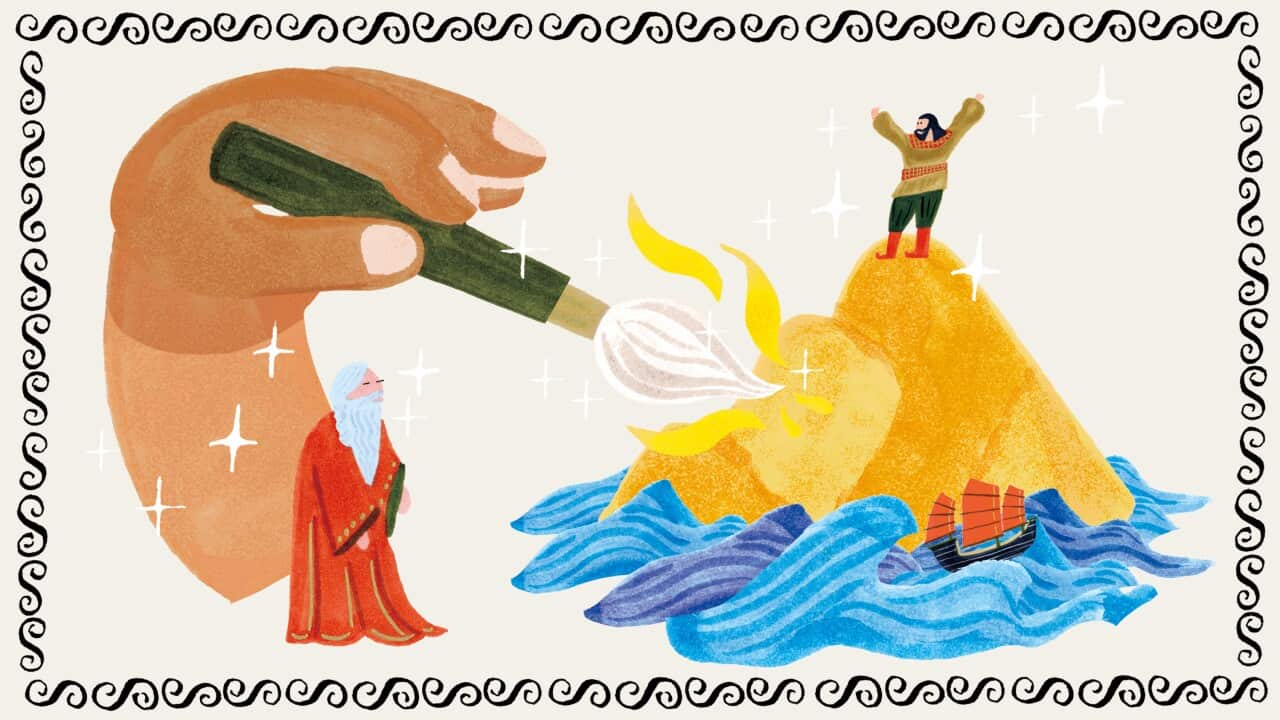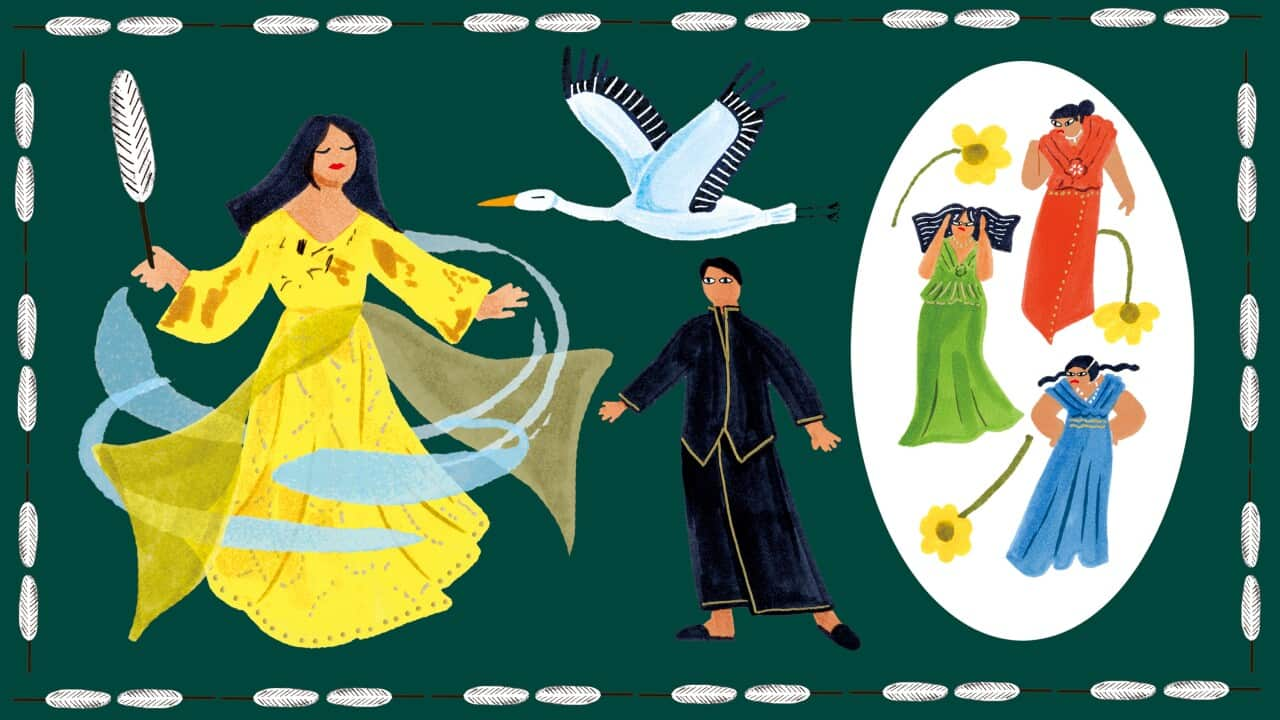This story originates from China. It is a heartwarming tale about community and a gentle warning about the consequences of selfishness.
Host and narrator: Alice Qin.
Story consultant and translation: Yuye Lu.
Story editor: Marcel Dorney.
Voices: Jenny Zhang.
Executive producer, sound design and music: Kieran Ruffles.
LISTEN TO

Ma Liang and the Magic Brush
SBS Audio
24/10/202414:18
TRANSCRIPT
Once upon a time, in China, there was a young man called Ma Liang.
He lived in a small village, and worked for a rich man, tending his cattle.
Ma Liang’s parents had died while he was still very young, and he had been shown great kindness by the people of his village.
They liked Ma Liang because he was always, himself, very kind and polite. He loved to draw, and in many houses in the village, there were pictures that Ma Liang had drawn, often to say ‘thank you for your help’.
Ma Liang’s own house was filled with pictures, because he practiced drawing whenever he could, using an old paintbrush.
He drew what he saw - houses and streets, rivers and fields, cattle, and people - and also what he dreamed. Those pictures, however, he drew for himself, and did not show anyone else.
One night, after a hard day’s work, Ma Liang fell asleep without even touching his brush and paper. He dreamed that he was on a mountain range, looking across valleys, fields and rivers, all the way to the eastern ocean. It was a beautiful view, and he longed to paint it, but his hands were empty.
“Do you like the view?” came a voice, like that of an old man.
Ma Liang looked around, and - sure enough - an old man, dressed in a traveller’s cloak, stood nearby, gazing out at the view below.
“Many people have painted this,” said the old man, looking at Ma Liang, who noticed that the old man was holding a beautiful new paintbrush.
“It’s beautiful,” said Ma Liang.
“From this angle, yes,” said the old man. “Because we’re so far away, we see as the gods might. But we are not gods, you and I - we live in a world of human beings, who need help from one another.”
The old man looked at Ma Liang.
“Up until now, you have painted the world,” he said, “Perhaps, however, the point is to change it.”
As he said so, he extended his hand, as if to offer the beautiful paintbrush to the young man.
Ma Liang woke, in the darkness of his little house. Feeling very alone, he got up and lit the lamp on his desk.
It took a moment for his eyes to focus on the paintbrush, lying next to the lamp. It was just as beautiful as it had been in his dream.
II
The next morning, on his way to work, Ma Liang visited his neighbour, a farmer whose rice fields had been gradually drying through lack of water.
“It’s getting worse,” his neighbour said, his face lined with worry.
“What we need is a canal to bring water from the river. But that’s just a dream.”
Ma Liang took a deep breath.
Well, he said to himself, 'let’s give it a try.'
He took the paintbrush from his pocket and unfolded a piece of paper.
“My friend,” he said, “can you describe to me where the canal should be dug?”
The farmer was puzzled but happy that Ma Liang would be interested and described it to him in detail.
The paintbrush in the young man’s hand darted over the paper, swift and sure.
“That’s it,” said the neighbour. “Now, if only.”
He was silenced... His eyes grew wider and wider, and he shook his head as if to clear it.
For as the two men stood there, water began to rise around their ankles... as the rice field began to fill, from the distant river, fed by the canal that now sparkled in the sunshine.
“Is this...” the farmer went to say, but he looked at Ma Liang and did not have to ask, for the young man was as amazed as he was.
“Thank you,” his neighbour said.
“Do you - need me to keep this a secret?”
“I don’t see how,” said Ma Liang.
“But you could suggest who I should visit next.”
III
The only house in the district where Ma Liang had never drawn a picture was the big house of the rich landlord, who owned the cattle Ma Liang looked after.
The landlord was not a kind man and often refused to pay his employees on time for some petty reason or another.
Although he was not well-liked, the landlord knew a great deal of what happened in the district, and it was only a few days after Ma Liang had started to use his paintbrush that the landlord heard the story of the young man whose pictures came to life.
The landlord took pride in what he called his mindset.
In every situation, he said, there was a way to achieve the maximum advantage.
In this case, it was obvious to the landlord that he, being rich and powerful, should use his power to acquire this magic paintbrush and make himself even more rich and powerful.
This, he was sure, was the natural order of things.
So that very evening, the landlord sent several large men to Ma Liang’s little house with strict instructions not to hurt the magic paintbrush.
Ma Liang was soon locked up in the basement of the police station, charged with theft of a paintbrush, which, as the large men assured the police, would now be restored to its rightful owner, the landlord.
For the next few days, the landlord tried everything he could.
He drew and drew, but nothing changed except the paper he ruined. He hired an artist from another district, but although this man could actually draw, his pictures were also just pictures.
Finally, he was forced to send word to the police station that the thief, Ma Liang, should be brought to his house.
When Ma Liang came, he said to him, “I suppose you know why you’re here.”
Ma Liang, who knew very well why he was there, said nothing.
“You’ve stolen from me,” the landlord went on. “But I have decided to show you mercy.”
The young man looked around the room.
Scattered all around were dozens of pieces of paper, which the landlord had covered with pictures of money, weapons, palaces, women, and flying machines.
"If you draw some pictures for me and turn them to life,“ said the rich man, “I will drop the charges and see that you are set free."
“I have made a promise,” said Ma Liang. “The paintbrush was given to me so that I might help people.”
“Well, then,” said the landlord. “You can help me. And in doing so, help yourself to not be in jail. That’s what we call an incentive.”
IV
Ma Liang was silent for a moment. Then he picked up the paintbrush, and on the easel that the rich man had put by his great front window, he set a new piece of paper.
"Smart boy,” said the landlord. “First things first, I want a golden mountain.”
The young man’s hand began to dart over the paper. The landlord cracked a smile as he saw the brushstrokes. But as they formed into an image, the landlord’s face twisted into a grimace.
“What are you doing?” he barked. “That’s a sea. Don’t draw a sea. I want a mountain. Made of gold. That’s what I said.”
“If I just draw a golden mountain,” said the young man, his hand flying across the paper, “anyone can get to it, and steal your gold. That’s why I’m drawing a sea around it.”
“Ah,” said the landlord, “yes, well, you see, you should have waited for me to ask for that, but good, good, go on.”
Ma Liang’s forehead creased in concentration as he drew.
“So,” he said, “there… is your mountain… surrounded by ocean… and a coral reef… with an opening there… and if you look outside, my lord, you will see… your ship.”
The landlord rushed to his great window, which overlooked the ocean.
Sure enough, a great sea-going ship bobbed at anchor, with a crew of shiny robots saluting their new captain.
In the distance, the landlord could see a glimmer of gold rise above the waves.
“Now,” said Ma Liang, “I will draw the wind that will take you to your gold.”
“Wait, you idiot!” cried the landlord, running to the door. “Wait until I get on board the ship before you draw the wind!”
“Aye, aye, sir,” the young man said, “May fortune follow you.”
“I don’t need fortune,” the landlord snickered. “I’ve got you, and I’ve got the police. Remember that you’re still a thief until I get back, and we’ll see about dropping those charges…”
From the window, Ma Liang watched as the landlord boarded his new ship, barking orders at the robot crew.
Then he raised his paintbrush.
“And there,” he said to himself, his hand darting across the paper, “is the wind.”
He watched as the ship moved out into the open ocean, full speed towards the golden mountain. Then Ma Liang raised his paintbrush again.
“And there,” he whispered, as the ink stained the paper, “there is the biggest… wave… this ocean… has ever seen. Right… there.”
He gave a final flick of his wrist and turned away from the window. Looking around, he found a cloth to wrap up his paintbrush and put it in his pocket.
Finally, he took the paper from the easel and looked to where the ocean stretched, clear and blue, to the golden mountain in the distance.
“Someone will find that eventually,” he said to himself as he walked out of the landlord’s great empty house down the road back to his village.
V
Ma Liang never told anyone of what had taken place.
He continued to help his friends and neighbours by changing their worlds just enough to make their lives and their work easier and more fulfilling.
It was a difficult task, and it took a lot of thought, and care, and consideration: and even then, he still made mistakes.
But, as Ma Liang would often think to himself, it was a small price to pay for the privilege of using that paintbrush.
Story Ends.


